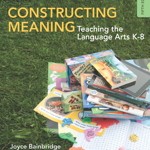From Literacy to Multiliteracies
We were delighted to welcome Dr. Jim Cummins from OISE University of Toronto as our Keynote Speaker at the Language and Literacy Researchers of Canada Pre-CSSE conference this year. Jim’s talk, From Literacy to Multiliteracies set the context for our discussions for the day providing a helpful overview that mapped various policies and practices that have shaped discussion and pedagogy in North American classrooms over the last couple of decades.
Given the institutional contexts that we are operating in, Jim’s talk was a call to refocus on engagement and rethink classroom pedagogy in ways that allow us to showcase students’ abilities. Technology is one way to amplify the unique and local abilities of our students.
Jim returned to a common theme in his work; reminding us to ask ourselves a key question: What image of the child are we sketching in our instruction?
-Capable of becoming bilingual and biliterate?
-Capable of higher-order thinking and intellectual
accomplishments?
-Capable of creative and imaginative thinking?
-Capable of creating literature and art?
-Capable of generating new knowledge?
-Capable of thinking about and finding solutions to social
issues?
He asked us to consider what our current realities are, what our vision for the future is, and how we might move from the former to the latter. He offered some of his own thoughts about this process by providing an organizational framework representing his current thinking on this topic. Recognizing the goal of ‘literacy achievement’ -that he argued comes through print access/literacy engagement,
he suggests that we need to keep four practices in mind: scaffolding meaning; connecting to learners; lives; affirming their identity and extending language.
He invited us to consider our own ‘blindspots’ to achieving our goals and to think about how we might address the gaps that exist between ‘in’ and ‘out of school’ literacies.
Jim has graciously shared his powerpoint: Cummins LLRC plenary May 26 2012
Thanks to Dianne Collier LLRC Pre-CSSE Conference Chair and her committee for organizing a very fruitful day.
Language and Literacy Researchers of Canada


